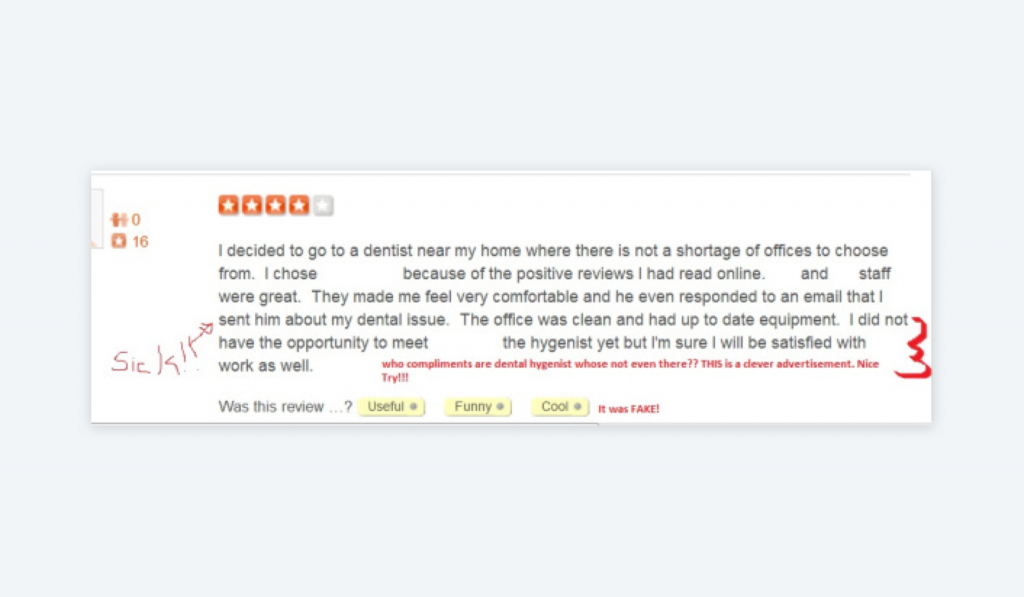When it comes to dental care, you are putting your trust in the hands of professionals. A good dentist can make a world of difference to your oral health. That’s why online reviews have become so important in helping us make informed decisions.
But here’s the problem: not all reviews are equal. In dental marketing, those suspiciously perfect online reviews that seem almost too good to be true are fake reviews, which can be a real pain.
It is because they depict:
- Misleading information
- Have an unfair advantage over competitors
- Damages reputation
- Chances of legal consequences
- Uses suspicious and generic language
- Omits prominent and specific details
So, how can you spot fake dental reviews and protect yourself from being misled? This blog explores all the red flags so you can make informed decisions about your dental care.
Let’s dive in.
Table of contents
How to identify fake dental reviews – 6 signs
The rise of fake reviews has made it increasingly difficult to separate genuine feedback from fabricated content. Here are some red flags you should be aware of to identify fake dental reviews:
- Spot marketing language
- Read the review thoroughly
- Check the reviewer’s profile
- Check your database
- Notice the sudden surge in reviews
- Check for short and poorly written reviews
Let’s dive into detail.
1. Learn to spot marketing language

Genuine reviews mostly have a natural and informal tone. On the other hand, fake reviews tend to use more extreme language to get their message across. Fake reviewers tend not to talk about the physical details of your practice. Therefore, they usually write using marketing or technical jargon.
FTC landmark judgment bans fake reviews and celebrity testimonials On August 14, 2024, the Federal Trade Commission (FTC) took a significant step to combat the growing prevalence of fake reviews and testimonials online. Key provisions of the rule: • Fake reviews and customer testimonials: Prohibits businesses from creating, selling, or buying fake reviews, including AI-generated ones or those written by people without experience. • Incentivized reviews: Bans businesses from offering incentives for reviews with a particular sentiment. • Insider reviews: Prohibits businesses from disseminating reviews written by company insiders or their relatives without clear disclosure. • Review websites: Prevents businesses from misrepresenting the independence of review websites they control. • Review suppression: Prohibits businesses from using threats or intimidation to suppress negative reviews and requires transparency about review gating practices. • Fake social media indicators: This law prohibits selling or purchasing fake social media indicators that misrepresent a person's influence.
2. Read the review thoroughly
Fake reviews are often written by a person who doesn’t know you and has never visited your practice. If the reviewer is trying to defame you, they may complain about staff, offices, or services that don’t match reality. If you find discrepancies in the review, report the case to the review listing website.
Cite details of your services and why you believe the reviewer is false.
Identifying Fake Dental Reviews: A Guide for Businesses
Want to see the impact of Birdeye on your business? Watch the Free Demo Now.
3. Check the reviewer’s profile

Most review websites allow you to check the profile of the reviewer. A person posting fake reviews usually won’t create a full profile.
As of 2024, leaving an anonymous Google review is no longer possible. Google has even deleted all previously posted anonymous reviews.
If you spot a review you think is fake, first look at the reviewer’s profile description. Look for an incomplete profile, a lack of a profile picture, no social connections, and a small number of reviews.
4. Check your database
Dentists and other medical professionals usually maintain a list of patients and appointments. This database can come in handy to spot an impersonator. They may mention procedures or treatments that you don’t provide. You can’t openly respond to a review that you believe is fake by posting this information on a public platform (doing so would be violate HIPAA guidelines).
But you can flag them on review sites for dentists and be ready to present your case.
5. Notice the sudden surge in reviews
If somebody is trying to defame your practice, they often won’t stop at one review. The imposter may create multiple profiles and post a number of negative reviews within a short span of time. If you find that your practice has suddenly received a lot of negative customer reviews, then they may be fake.
6. Check for short and poorly written reviews

A genuine review, both positive and negative, is written by a patient who believes they are adding some value for prospective customers. In most cases, a genuine review provides some details about your practice, your staff, and the treatment options that you offer.
A fake review often lacks firsthand information about you and your practice. This is one reason why fake reviews are generally short, vague, and often have grammatical and spelling mistakes. Such reviews should immediately raise an alarm and hence, be marked for further investigation.
Recently, a plastic surgeon manipulated positive reviews to gain a strong online reputation. When the law uncovered that he was allowed only positive 5-star reviews, manipulated before-and-after images, and forced patients to sign illegal non-disclosure agreements (NDAs), it penalized him and his company with $5 million.
FAQs on how to spot fake reviews in dental marketing
Most review platforms have a process for reporting fake or misleading reviews. Contact the platform’s customer support or use their reporting tools.
Creating or spreading fake reviews can lead to legal action, including fines and penalties.
While you may not be able to remove all fake reviews, you can often flag them for removal by the platform’s administrators.
– Encourage genuine reviews
– Respond promptly to reviews
– Monitor online reputation
– Educate your staff
– Cross-reference reviews
– Check reviewer profiles
– Consider timing
Addressing fake dental reviews is easier with Birdeye
Spotting fake online reviews and requesting the review listing website to examine them is one way you can ensure that your prospective patients get genuine information about your dental services and practice. Therefore, consistently encourage your patients to leave reviews online.
Here, Birdeye’s all-in-one, AI-powered platform can help you with:
Watch a free demo to get help with your dental marketing, get more patients to your practice, and see how reviews can work for you.

Originally published









